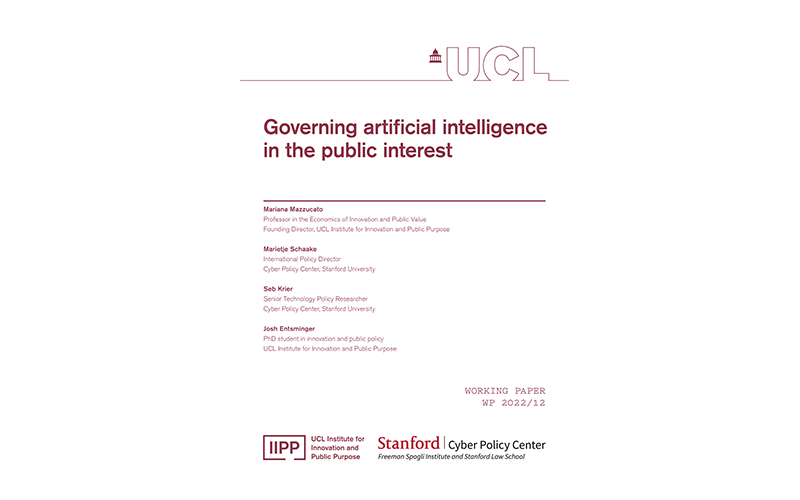Governing artificial intelligence in the public interest
This paper proposes an approach for developing and shaping AI capabilities by integrating the technologies in policies specifically geared toward a sustainable, equitable and green digital economy.

28 July 2022
UCL Institute for Innovation and Public Purpose (IIPP) Working Paper Series: IIPP WP 2022/12
Authors:
- Mariana Mazzucato | Professor in the Economics of Innovation and Public Value, Director, UCL Institute for Innovation and Public Purpose
- Marietje Schaake | International Policy Director Cyber Policy Center, Stanford University
- Seb Krier | Senior Technology Policy Researcher Cyber Policy Center, Stanford University
- Josh Entsminger | PhD student in innovation and public policy, UCL Institute for Innovation and Public Purpose
Reference:
Mazzucato, M., Schaake, M., Krier, S. and Entsminger, J. (2022). Governing artificial intelligence in the public interest. UCL Institute for Innovation and Public Purpose, Working Paper Series (IIPP WP 2022-12). https://www.ucl.ac.uk/bartlett/public-purpose/wp2022-12.
Abstract:
Artificial intelligence (AI) is being positioned as the defining general purpose technology of the early 21st century. Nations are racing to secure leadership in AI innovation capabilities, focusing on horizontal innovation policy to drive domestic technological competitiveness. However, we argue global and national administrations need to be more focused on the direction of AI innovation. We propose that a market-shaping approach can help align public and private interactions to drive AI towards advancing public interests. We further propose that this requires a bolder global technology policy agenda to align and shape State and non- State actors’ relationships within AI development and diffusion towards public interest activities. We conclude with a series of limited recommendations to help policymakers frame a market-shaping approach to AI governance.
Acknowledgements:
This research was built on work funded by the Omidyar Foundation and the Rockefeller Foundation.
 Close
Close

